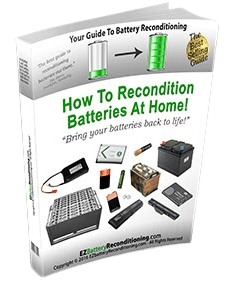Want to know how to store batteries? Read below to find out.
Batteries [1] store electricity. They provide energy to our portable devices, toys, tools, vehicles and much more.
With rapid technological advancements, we use batteries to store energy on a huge scale. Wind installations and solar power huge buildings and towers.
But, with most of us needing energy for more prosaic uses, we want our batteries to last as long as possible. This demands that we use care and safe storage to maintain their lifespan.
The important question is where and how to store batteries, including rechargeables. Let’s take a look at how to store aa and aaa batteries.
Table of Contents
Nickel Metal Hydride Batteries
Nickel Metal Hydride (NiMH) batteries can be stored for 3–5 years.[2] It is important to remember that the capacity of the battery drops during the storage tenure.
Priming can reverse this reduction in capacity. So this might be a conditioning cycle. This will restore capacity after prolonged storage. Or for a battery in frequent use, it can enhance battery performance.
NiMH batteries can be stored at any state of charge (at full charge or discharged). The storage temperature should be between -20 and +35 C. The humidity level should be approximately 50%.
If storing NiMH batteries for extended periods, recharging them once a year will prolong their lifespan.
Sealed Lead Acid Batteries
Sealed Lead Acid (SLA) rechargeable batteries, including golf cart batteries, are storable for up to two years. Like most batteries, they self-discharge over time. So a voltage and specific gravity check [3] are advisable before storage.
An SLA battery is designed to prevent electrolytes from leaking from its cells. But sometimes, the seals can rupture and cause permanent damage.
Moreover, it is also recommended to charge the batteries to capacity before storage.
Remove batteries from equipment and store them at room temperature or lower. The recommended temperature for storing SLA batteries is between –40°C and 50°C.
Whilst in storage, recharge the SLA batteries every six months. If you plan to store them for longer, use float voltages to cut the risk of corrosion and sulfation.
Alkaline Batteries
Alkaline batteries are disposables and need replacing once they expire. This is normally after around 3-4 months of use.
They are the most used batteries and are easy to store. For the best results, keep them at a cool room temperature with a relative humidity of around 50%.
Freezing alkaline batteries is not recommended as it could change their molecular structure.
If properly stored, alkaline batteries can last for 3 to 15 years. Though this depends on their type (carbon-zinc, lithium, etc).
How to store batteries – Hints and Tips
Here’s how to store batteries for long-term
Remove Batteries from Equipment
It may seem obvious, but you must remove batteries from equipment for long periods of storage. This enhances the battery life. Moreover, if the battery leaks, it won’t damage expensive equipment.
Temperature
Store batteries at normal room temperature. Generally, the recommended battery storage temperature is around 15°C.
Store batteries in a dry place out of direct sunlight. Batteries lose charging capacity in extreme temperatures.
The batteries will self-discharge when out of their equipment. But rechargeables keep 70% of their charge even after prolonged (8 to 10 years) storage.
Many people on the internet argue that the fridge and freezer are the best places to store batteries for long periods.
We do not recommend you store batteries in a fridge or freezer as it can change the molecular structure of the batteries. Also, condensation from the refrigerator can damage batteries and reduce their lifespan.
Packaging
Store the batteries in their original packaging or plastic boxes if you are not using them. Make sure that batteries are not in contact with any metal.
Use caps or plastic tape to cover the terminals. This prevents contact between the positive and negative terminals and avoids unwanted conduction.
Moreover, it is important to keep old and new batteries separate. Then you will avoid leakage and damage to the batteries.
Rechargeable Batteries
You can discard disposable batteries after us and you can recharge rechargeables. It is important that rechargeables are stored with at least 40% charge. This allows them to discharge gradually.
Humidity
When storing batteries, it is important to pay attention to humidity. Too much humidity is harmful to batteries and reduces their lifespan.
To keep the batteries away from high humidity, invest in a vapor-proof container. A 35% to 65% humidity level is best to store batteries.
How to store batteries – the Verdict
When and how we use batteries depends on our specific needs, and we may always use them on a regular basis.
The safe storage and protection of less-used batteries are important. And the suitability of storage methods depends on their types and chemistry.
As we have seen, those different types of batteries need specific measures to store them. And it is up to the user to decide the best way to ensure they will always get the most out of their batteries.
Like How to Store Batteries? – Check out our related articles.
And here’s a video about how to store batteries.
Is there a wrong way to store batteries?
Store batteries in a cool, dry place. Do not let different types of batteries touch and ensure that batteries are side to side, rather than end to end. Consider purchasing a purpose-built battery organizer or using a sealed plastic container.
Can you store batteries in Ziploc bags?
It is better to use a purpose-built battery organizer or plastic tub stacked side by side. In bags, they will become jumbled and disorganized. This can result in end-to-end touching which can cause shorts, ruptures or leakages.
Can batteries touch each other when stored?
They can line up side-by-side but not end-to-end. End-to-end touching can result in shorts or overheating. Also do not store them with other metal objects such as coins or paper clips.
Do batteries last longer in the refrigerator?
Batteries last a little longer at cold temperatures, but the cold air can harm them in other ways. If you store them in the fridge, do so in a sealed airtight container to prevent moisture from damaging them.


